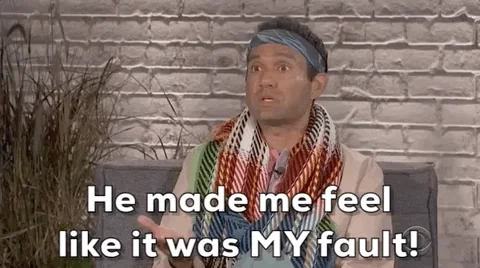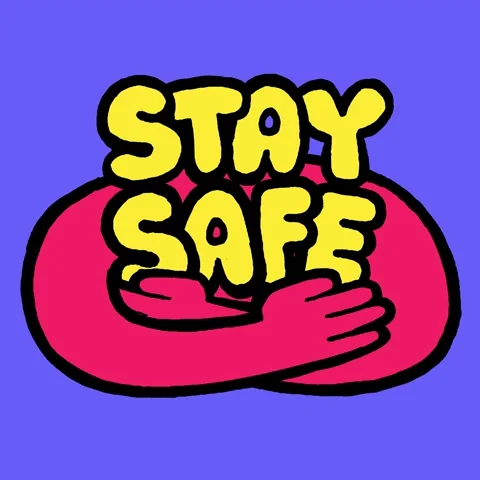Imagine this: you and your partner are on a date at a restaurant.

You notice your partner is on their phone a lot lately. You peek over their shoulder and see that they're on someone else's Instagram page liking their pics. Then that person messages saying, "Hey, are you coming over tonight?"
"Who's that?" You ask.
"Uh, an old friend" they reply hesitantly.
"I met all your friends, and I just saw what she messaged. Are you seeing her?!"
"You're crazy — It's no one! Stop overreacting!"
What's happening? You're being gaslit.
What is Gaslighting?
Gaslighting is a form of emotional abuse in which one person (the abuser) manipulates their partner (the victim) by distorting their reality, causing them to doubt and question themselves. Gaslighters do this to avoid accountability and to control their partner.
Victims often feel:
confused
powerless
isolated
They often seek validation from their partners.
It's not easy to recognize gaslighting, but you can learn how to appropriately respond to gaslighter phrases and prevent your partner from manipulating you.
Identifying Gaslighter Phrases

There are 5 main types of gaslighting:
Obvious lies: Your partner lies right to your face even when evidence is presented to them.
Coercive behavior: Your partner distorts your reality by persuading you to do something with threat or force.
Scapegoating: Your partner blames you (or another person) instead of taking accountability.
Manipulating reality: Your partner twists the story to fit their narrative.
Trivialization: Your partner dismisses information to make you feel like your thoughts, feelings, and contributions are unimportant.

These types often overlap and are not always obvious. If you're unsure if your partner is gaslighting, consider the following common gaslighter phrases.
Obvious Lies
"That's not what happened."
"You're making that up."
"I never said that."
Coercive Behavior
"If you really loved me, you'd do it."
"Everyone else does it, so why won't you?"
"This is for your own good."
Scapegoating
"It's all your fault."
"If you weren't so [lazy/stupid/etc.], this wouldn't have happened."
"Look what you made me do."
Manipulating Reality
"That's not what I meant, you misunderstood."
"That's not how it happened."
"You never told me that."
Trivialization
"You're being so dramatic."
"You're upset over that? Seriously?"
"It's not a big deal."
Responding to Gaslighting
If left unchecked, gaslighting can have a serious impact on your mental health and other relationships. It's important to take control of the situation and respond to gaslighter phrases appropriately. There are certain ways to respond to specific gaslighter phrases, but in general:

Stand Firm
Stay confident in your version of events. You know what happened, so repeat it confidently. Show your partner any proof to encourage them to back down. If they continue to challenge you, don't get caught in the snare.
You can say:
"That's my memory of what happened."
"It seems like we remember things differently, but I don't want to argue about it."

Call Them Out
Call out the gaslighter as it happens and make them aware that you see through their tactics. Use "I feel" statements to express your feelings about the conversation, which will make it harder for them to argue with you.
You can say:
"I feel misunderstood when my words are taken out of context."
"I feel hurt when you dismiss my feelings."

Disengage from the Conversation
If you argue with a gaslighter, you'll never win the argument. Even if you have the evidence to prove your point, the gaslighter will likely respond through denial and deflection.
You'll know when to remove yourself from the conversation when they refuse to acknowledge your point of view, when the conversation becomes repetitive, or when you feel emotionally drained.
You can say:
"I won't engage with someone who dismisses my feelings."
"This conversation isn't going anywhere and I need to take a break."

Give Yourself Space
It's important to provide yourself with mental and physical space from the gaslighter. It will allow you to have clearer thoughts, and you'll become better at engaging effectively with the gaslighter.
Assuming you disengage with the gaslighter, you can give yourself space by:
Going for a walk
Quiz: Nina & Sam

Nina and her partner Sam have been discussing plans for a weekend trip. Nina recalls discussing the details in person, including Air BnB reservations, who would drive, and when they should leave.
The day before the trip, Nina asks her partner to confirm the time they should check in to the Air BnB, but her partner responds:
You always plan things last minute, and now we're unprepared.
Nina insists they talked about it in the past week, and Sam partner responds:
Well,if you were more organized, we wouldn't be in this situation.
Quiz
What form of gaslighting is Nina experiencing?
Quiz 2: Nina's Response

How should Nina respond to Sam?
A. Disengage by saying, "Fine, let's just drop it."
B. Trust her memory and express how Sam's comment made her feel.
Quiz
Select the best response:
Take Action

Knowing how to identify and respond to these gaslighting phrases is the first step in saving yourself from an abuser. Remember to trust your instincts.
Your feedback matters to us.
This Byte helped me better understand the topic.

